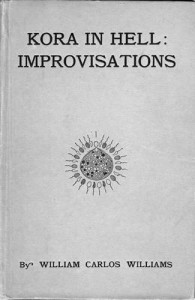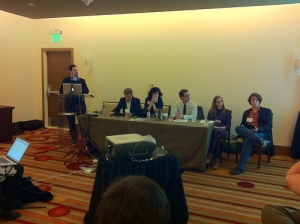It’s no secret that ProfHackers are fond of Twitter. Ryan Cordell wrote a thorough and helpful post on “How to Start Tweeting (And Why You Might Want To.” Mark Sample has offered a pedagogical framework on teaching with Twitter as well as <a target=_blank href="http://chronicle.com/blogs/profhacker/practical-advice-for-teaching-with-twitter/26416" …read more
Jun 21
Travel Mishaps: Name (Mis)Spelling Edition
Last week, I was fortunate enough to attend the Digital Humanities Summer Institute (DHSI) at the University of Victoria. I had been looking forward to the trip for months. I was enrolled in a class on TEI and Primary Sources, I knew a few colleagues and friends would …read more
Jun 20
Ph.D. Placement Project
Regular readers of the Chronicle are surely familiar with the ongoing discussion about the merits of graduate education both generally and in the humanities more specifically. Whatever your position on the “Go! / Don’t Go!” debate (note: two different links), one thing is clear: more information about …read more
May 06
“The eternal bride and father—quid pro quo”: William Carlos Williams, Marcia Nardi and Paterson
The essay linked to here was originally published in The Heritages of William Carlos Williams: Points of Contact. Edited by Ian D. Copestake, Newcastle: Cambridge Scholars Press, 2007. 80-100.
The images above, photographs of the dust jacket of Kora in Hell, are relevant to the contents of the article. Specifically, I discuss the significance of the center “medallion” as Williams called it. It’s a line drawing in ink of an egg cell in the process of fertilization. Images courtesy of Eric White.
“The eternal bride and father—quid pro quo”: William Carlos Williams, Marcia Nardi and Paterson”
Apr 30
Managing Seasonal Allergies
As Mark observed last week, ProfHacker has a whole series of posts dedicated to Health and Wellness. In addition to running with/from zombies, we have featured posts on managing stress, fitting in fitness, …read more
Apr 25
Belkin Ultimate Keyboard Case for iPad: A Review
In the fall, I reviewed the Logitech Ultrathin Bluetooth Keyboard for iPad. A few weeks ago, Belkin contacted ProfHacker and asked if we would consider reviewing their Ultimate Keyboard Case. I’ve been putting this keyboard through …read more
Apr 19
Methods for Organizing Your Apps
ProfHacker has featured several posts about various mobile apps. See for instance the Open Thread Wednesday dedicated to (y)our Favorite Weather Apps, guest author Ian MacInnes’s post on “Finding the …read more
Feb 13
Open Professoriat: Public Intellectuals on the Social Web (Repost from MLA11)
[This post was originally online at eetempleton.wordpress.com.]
In my contribution to the MLA Roundtable, which is titled, “Openness: Too much is Never Enough? Or, at What Cost?”, I am interested in interrogating the term “Open Professoriat.” I want to think about what the term might mean and what it might look like. Like the term, “digital humanities,” which has been discussed much both at the conference and online, I think that the idea of an “open professorship” is one that we use and we think we understand, but which we haven’t stopped to define. Of particular interest to me is “open” part of the equation.
One model for an Open Professoriat might be the Open Yale Courses, which are available to anyone with an internet connection. Users can simply go to a website (oyc.yale.edu) and watch video recordings of classes in such varied subjects as biomedical engineering and the contemporary American novel. In this model, open equals open access. My purpose here isn’t to knock Yale or these classes (or other institutions like MIT who have instituted similar models). Indeed, I’ve read transcripts for several of the courses and learned a great deal from them. But at the same time, this model of an open professoriat is a strictly passive one based not on collaboration but on consumption. There is no more opportunity for the exchange of ideas than there is with the daily reruns of Law and Order. I can (and often do) talk to Jack McCoy, but there is little chance of him answering me in my living room. I do not think that his model of open access is what most of us would hold up as an ideal for an open professoriat simply because the openness only flows in one direction—outward. It’s the difference between looking through a window and walking through a door. To be sure, it is a step in the right direction and can work wonders in helping the rest of the world at large see what happens in a university classroom particularly in times like these when higher education in general, and the humanities in particular, are under fire. Perhaps letting others in on what we trying to accomplish, both in terms of research and pedagogy is a good thing.
Other models of an “Open Professoriat,” both research and pedagogy, have been discussed not only here in our panel but in others throughout MLA. One example would be the ProfHacker Session yesterday where Brian Croxall and George Williams talked about writing in their own names (rather than using a pseudonym) about the challenges and difficulties of the profession as well as about personal failures as learning opportunities. Another example would be Ryan Cordell sharing his work on Hawthorne and Kathy Harris discussing various different pedagogical tools and strategies.
It is perhaps rather obvious to say that social media plays an important role in an Open Professoriat because it can facilitate exchange and collaboration. For me personally, it has been a lifeline to others working both within and outside my field. Thanks to Twitter, I participated in a productive and supportive reading group this past summer with scholar across the eastern seaboard. My students and I both benefitted from suggestions from Facebook friends when I posted a call for possible novels to include on a syllabus. These various kinds of media have provided channels of communication and created proximity where it did not exist previously.
But I want to return to the question of openness . . . How open can something like Twitter be if it is filled with people who always already share (more or less) the same perspectives and ideas? Where does difference come from?
And how is that ideal of openness challenged and possibly even compromised by itself? That is, how open can we be if our chair is following our Twitterstream or our dean is our Facebook friend? Or if you are on the job market? Or untenured? Whether one protects their tweets, declines friend requests, or resorts to self-censorship, the end result is the same, openness might be a bit misleading.
But lest you think that my point here is to encourage folks to commit career suicide on this very stage of openness, it’s not. Rather I want to suggest that while openness is something to be celebrated, it’s also something that we need to think carefully about, particularly as social media continues to proliferate amongst the academy and its members. These tools certainly can broaden the audience for academic work, but perhaps less so than we might think. If we are only share information amongst ourselves, we are missing out on valuable opportunities for collaboration and exchange. In the end, I want to suggest that tools like Twitter and Facebook are vehicles for one kind of exchange among many. These are valuable but not exclusive. And on that note, I’ll close with a call for another different kind of interaction and that’s with you, our audience.
For the Inside Higher Education article about our panel, CLICK HERE.
You can find my fellow panelist Mark Sample’s paper, titled “Tactical Collaboration: or, Skilfull in both parts of War, Tactick and Stratagematick” HERE, and the Prezi presentation HERE. Amanda French’s talk, titled “Your Twitter followers and Facebook friends won’t read your peer-reviewed article if they have to pay for it, and neither will strangers” can be found HERE.
Feb 11
The Future of the English Dept.
Sometime in the fall of 2012, I was asked to contribute a short essay on the future of the English Department for Expositions, an interdisciplinary journal of the humanities published by Villanova University. I probably should have come up with a better title for my piece, something more creative and less pretentious, but there you have it. Other contributors, an addition to the organizer, Janine Utell, include Liana M. Silva-Ford and Richard Hertz. It appears in vol 6, no. 2 (2012) p55-57.
Here’s a PDF of my contribution should it interest you.
Feb 04
Medical Emergencies in the Classroom
While we have written posts about various kinds of classroom disruptions, until now ProfHacker hasn’t covered what to do in the event of a medical emergency in the classroom. How would you deal with a student who has an epileptic seizure in class? What if a student passes out, …read more










